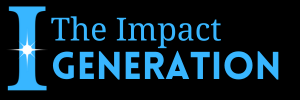Introduction
The first step of the One Workshop Away model is to know yourself.
This involves doing a deep dive inventory on you as a person. Within the Impact Generation, we walk you through two exercises, each one taking anywhere from 3 to 5 hours. This is serious work, and you should give it the appropriate time.
Pathway to Income

The first exercise is called the Pathway to Impact. It is based on the well-known Ikigai model but is adapted for the Impact Generation. This exercise is the intersection of four big questions:
- What do you love to do?
- What are you good at?
- What can you get paid for?
- What does the world need?
This exercise gives us a preliminary snapshot of where your skills intersect with the needs of the market or the wider world.
And this last part is critical.
We want to help you develop into an entrepreneur of impact. This means monetizing your skills, expertise, and craft SO THAT you can make a difference in a context that matters to you.
When you contribute meaningfully to another person’s life, or to solving a problem in the world, that’s where purpose and meaning come together.
The result is a deep fulfillment.
This Is Your Wonderful Life
The second exercise is called It’s Your Wonderful Life. It’s a bit more intense, and it’s one of my favorite parts of the work we do here at the Impact Generation.
In this exercise, we look at your DNA, childhood, interests, passions, education, and the skills you’ve developed from your craft, work, or vocation. After doing this inventory, we map those unique traits to problems you can help others solve or goals you can help them achieve.
Those are the keys to marketing. Solving problems or helping others reach their goals. But in reality, it’s just human psychology. That’s why folks are on Google and YouTube. You are meeting deeply held human needs.
Recovering Your Lost Creativity
In doing this deep work, we don’t just help you identify the obvious skills you can monetize. Instead, our interest lies in helping you recover the not so obvious skills you might have forgotten since you were a kid.
- We want to know about your city of birth, and if it holds any significance for you.
- We inquire about your birth order, whether you were an only child, the oldest, youngest, or the middle child like me?
- We ask about the cities you have lived in. My own children grew up in three Latin American cities. These experiences strongly shaped them as well as their interests in college and life.
- We ask about your favorite subjects in high school, and the activities that absorbed your time or in which you got lost? What did you think was cool back then?
Questions like these have had a significant impact on who you’ve become, and it’s important to recall these factors.
=====
But there’s something deeper going on. I believe that our educational system as well as society is good at squelching the creativity, curiosity, and dreamability that you had as a child.
Think about it.
As a kid you wanted to learn about everything, and you wanted to be everything. There were no limits to your future as a fireman, astronaut, or race car driver. And then around grade school, the school system began to mold you. And suddenly you began to learn to pass an exam. And this continued through junior high, high school, and even college.
Sixteen years later, you’ve been molded into society’s idea of a good student, worker, and citizen.
And your creativity has been domesticated or even destroyed.
The Social Matrix
But it doesn’t stop there. The social matrix is good at defining the categories under which you must live. Your degree or job may not have been your first options. You chose them because of parental pressure or because you felt it was the responsible thing to do (you know, so you could get a job).
Years later, you have debts, responsibilities, a wife, partner, or kids. And it would be difficult, painful, or even impossible to switch to something else.
Thus, this first step critical. Indeed, the whole model is geared to reawaken you to your enormous potential. We want to give you hope that perhaps you can create another reality for yourself via the digital economy.
But we’re getting ahead of ourselves.
There’s No One Else Like You
Earlier I mentioned that everyone is searching the Internet for solutions. Today, we don’t lack for information online. But one of the strengths of our model is you. The reason we can encourage you to enter any market, no matter how saturated is because no one else has your perspective.
You are a monopoly.
There’s no one else with your stories, experiences, skills, interests, or passions. And the beauty of the digital economy is that you get to flex all of that.
No one can compete with You. Inc.
Conclusion
The first step in the One Workshop Away model is to know yourself. You have to do a deep dive on you. If you get this part right, you will have the foundation of an inspiring business based around the things that excite you and give you life.
Once you complete this step, now it’s time to move on to Step 2 – Knowing Your Audiences.
